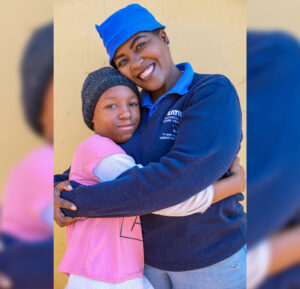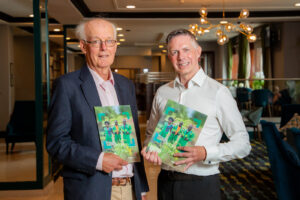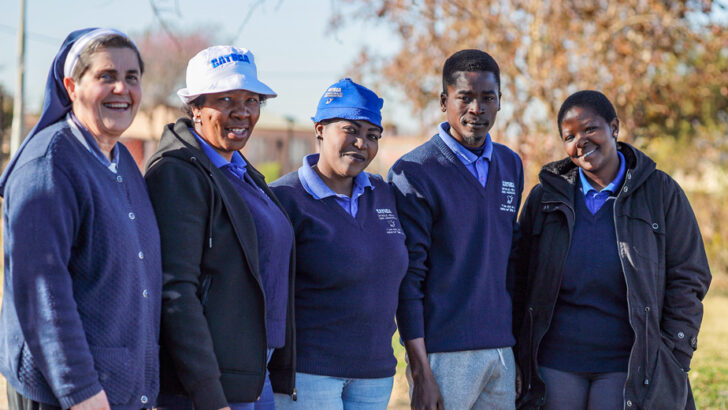World Mission Sunday 2023 – Celebrating and Supporting the Legacy of Irish Missionary Work
An Irish missionary speaks to Chai Brady about police brutality and oppression, and tackling gender-based violence in South Africa
The profound culture shock and oppression witnessed after landing in South Africa as a young idealistic sister in 1984, ready to help the vulnerable and needy, was enough to “tear your heart apart”, according to the new leader of the Missionary Sisters of the Assumption.
Having taught children for decades through apartheid and civic unrest, Sr Mary McAteer, who is still based in South Africa, says her Faith helped her through harsher times. Hailing from Antrim, she went to a school in Ballynahinch, Co. Down. It was there she first met the Missionary Sisters of the Assumption and driven by a calling to help the less fortunate in an unequal world, she joined the congregation and found herself in a South Africa embroiled in conflict.
Sr McAteer began teaching in a high school started by the diocese in the township of Atteridgeville to the west of Pretoria. The school taught black children and mainly consisted of staff who were black, with Sr McAteer and two other sisters being the only white teachers.
“The only other white people you would see in the township were a couple of doctors who used to be in the hospital, and then – as it was a desperate place – in the army every now and again. They came in and out,” Sr McAteer recalls.
Supported
The sisters said she was well supported by the local bishop who visited her in the school because the diocese was concerned, as it was “nearly in a warzone”. During a visit, Sr McAteer said: “After he spoke, the bishop called me over and said, ‘I was worried about you’ – He knew I was only out from Ireland – and then he said, ‘But then they told me you’re from Belfast and I said, sure she’ll feel at home’. While I didn’t grow up in Belfast, but at least I did know the desperation of oppression – but not the way it was here.”
Sr McAteer described the situation as “terrible”, recalling giving “naïve” advice to a young boy she taught. She said: “I remember at one time with one of the boys, his arm was all cut, and I said: ‘Did you fall?’ He said, ‘No we were talking and the army came along so we ran and I fell.’
“I said in all innocence, ‘Maybe when you run they think you’re doing something wrong and then they chase you, maybe if you just stood there they wouldn’t’.”
She continued: “So the next night at 12 on the dot there’s a phone call, ‘Sister, you told me not to run, I didn’t run and now I’m in jail can you come and get me?’ It was a desperate, desperate time, you couldn’t imagine that it would end even.”
Mandela
She remembers speaking to members of the black community about Nelson Mandela, who was still in jail at the time (he was released in 1990), and how there was a feeling of hopelessness against the brutal South African apartheid regime. “I remember saying to some of them, ‘You know one day Mandela will be released’, I was told ‘You people know nothing that come from the outside, Mandela will never be released, he will die in jail, you people don’t understand’. It was desperate times altogether,” Sr McAteer reiterated.
After four years she moved to a rural area, far from electricity and running water. Sr McAteer recalls teaching people how to vote in the first all-race election in South Africa in 1994. Many adults were illiterate and needed to be shown how to use a pen and to write an ‘X’.

She said: “On the day of the election, I will never, ever, ever forget it. It was a very isolated area so you never saw many people at the same time. They lived in traditional homes made of grass. But that morning there were queues to get in to vote. The older grannies were pushed in wheelbarrows. They were sitting their smiling, the young men pushing them, going to vote for the first time – it was unbelievable, even as I say it, the emotion and the wonder after all the violence that had happened, and all the oppression, that it could come to these people going to vote all around the country in peace.”
In 2016 Sr McAteer went to work at a small school for children with disabilities in Port Alfred, in the Eastern Cape. The school provides a space where children can learn, play, socialise and learn simple skills training as they get older. It is one of very few such educational opportunities in the area for children with disabilities. This is one of the projects that received funding from Irish charity Misean Cara, which supports missionaries working worldwide to empower those left furthest behind.
Encouragement
Another sister, Sr Elizabeth, established the school – the English name of which is ‘A Place of Encouragement’ – after seeing many children with disabilities being excluded from mainstream school and being forced to stay at home. When Sr McAteer arrived many of the children were turning 18 and “there was nothing else for them”.
“The risk of abuse for disabled young people is very high, they are more likely to be abused than anyone else,” the sister said. So she began, with the help of locals, to teach them gardening, knitting, sewing, cooking and more. Subsequently an Irish volunteer from Dublin, sent by Viatores Christi, trained workers to teach people with disabilities and “really helped to raise the standards,” according to Sr McAteer, who admitted at that point she didn’t have specific training to teach those with disabilities. She added that the project is “going strong” and continues to provide more services.
Among the projects the congregation is involved in – with the support of Misean Cara and in partnership with the Catholic Healthcare Association of Southern Africa, known as Cathca – they help those suffering gender-based violence.
“There’s an awful lot of gender-based violence in South Africa across all economic strata,” said Sr McAteer. “I suppose among the very poor where there’s so much desperation, it’s even worse. Cathca is running support services in several areas where there’s nothing, there’s just tin houses. They do a great job.
“They identify an organisation who are already trying to do something, get them to identify five unemployed young people who have some umph in them, who would like to help, and then Cathca go and do a week’s training with them about gender-based violence.”
The training involves several factors, including how to raise awareness. Those involved also meet other key stakeholders, who may be representatives from the nearest clinic, the police, a women’s shelter, someone from the Department of Social Development, a counsellor and others involved in the area.
The young people would then go to the local pub, schools, places where there are refugees or migrants and raise awareness. They also visit people’s homes and hand out small cards which would have the name of the police officer, someone from the clinic, the shelter and so on.
Sr McAteer said the idea is that when they are at the home, if the woman in question “can’t speak freely – because maybe the man is near – that she is a victim of abuse, they just say goodbye, shake hands and put this card into their hand just so they have it”.
She added that she visits the young CAs (Community Advocates) saying they “are full of idealism they think the world is good and marriages are good and then they come across these desperate stories and at that stage… they are half broken. They were weighed down by it.”
Sr McAteer highlighted the importance of Misean Cara’s support to keep the project up and running. Among other aspects, they pay the CAs which allows them to continue doing their work, helping women suffering gender-based violence.
Encouraging
The current Chair of the Misean Cara Board of Directors, Kevin Carroll – who has been involved in overseas development for 40 years – spoke to The Irish Catholic about the importance of Irish missionaries, who have and continue to make a huge positive difference in countries all over the world to this day.
Having lived in Kenya, Zambia, Uganda, India and Sudan, working with Irish Aid, Trócaire, Concern, Mr Carroll is no stranger to missionaries around the world.
He said: “They have a commitment that you may not get in other areas. NGOs do tremendous work as well, but where missionaries shine is that they are a witness, they have a presence when they move into wherever location it’s going to be – and it’s often places that are in the middle of nowhere. They learn the local language, they become a part of the community and when things get tough as they often do in war torn areas like South Sudan and even in Uganda, they stay.”
He explained: “When I was in Uganda, parts of the country where quite unsafe, but the missionaries stayed, they didn’t leave. That gives people, local communities, a huge sense of reassurance that they are cared for, that they are valued. That is what attracted me, when I retired, to become involved with Misean Cara because I believe that not only just the presence but the quality of the work that they do in development is in many cases quite extraordinary and it’s quite varied. They do the basic stuff – the really important basic stuff – the building blocks for development are education, healthcare, those kinds of things. But they also have done extraordinary work in the promotion of human rights often at great personal cost.
Mr Carroll gives Fr Gabriel Dolan SPS, a Kiltegan missionary, as an example of a person who went beyond the building blocks of development work in his tireless fight for human rights in Turkana, a very poor region of northern Kenya.
Fr Donal wrote a memoir called Undaunted which Mr Carroll recommends, saying if you want to know the impact of missionary work “read the last piece of each chapter”.
Giving an example, Mr Carroll said: “He was getting legal aid for people to get registration of their land so they can stay where they live and not be evicted. The impact small initiatives like that can have on people’s livelihood is quite extraordinary. You are often targeted because you are challenging the system, challenging unjust structures.”

Looking to the future of Irish missionaries, Mr Carroll guesses there are about 400-500 left around the world, when there used to be thousands.
He said: “The encouraging thing about it is there a lot of young non-Irish missionaries joining congregations. The Holy Rosary Sisters in Ireland currently have their first African Superior General. There’s a transition taking place and there’s a lot of very capable missionaries emerging, I’ve met them in my travels – young and highly enthusiastic, working in Sudan, Kenya, Nigeria. So that is the encouraging part, that transition is happening at the moment… encouraging African, Asian, South American people into the congregations.
“I think that’s a very healthy thing because in reality the age cohort of the Irish missionaries is quite high. A lot of them are quite elderly now, they’re not going to be there forever, so I would be encouraged by that.”
Hopes
Sr McAteer – still a very active Irish missionary – asked about her hopes for South Africa, which continues to face a plethora of social issues including unemployment and crime, said she would like to see those who have nothing “get a fairer share of the world’s goods” and that their right to dignity is accepted “and they are able to live in peace and harmony and develop their gifts”.
“If your big concern every day is getting something to eat these other things get pushed aside. So if people had their basic rights, it could be a very different place,” she said.
Faith
“If it wasn’t for my Faith I don’t know where I would be, especially for those first four years,” Sr McAteer said. “I suppose when you’re younger, I was all idealistic in my 20s full of energy to change the world, and then met police brutality and oppression. There’s a bit in the Bible where it talks about the God of Abraham, the God of Isaac and the God of Jacob, and I remember, there’s a big church there beside the school where I was in the first four years and I remember going in and saying ‘And who are you, this God, who is here, and all of this… you know, a child would be playing in a garden and the next thing he’s shot by a bullet that’s meant for somebody else’.”
Despite these challenges she insists that “Faith is what makes it all possible”.
Regarding the work of Irish missionaries, Sr McAteer said that it is her conviction that what missionaries give is small in comparison to what they receive from the poorest of the poor and that young Irish people should consider a vocation to the missionary life.
“I would encourage this present generation of Irish youth to think about coming to help in an area that is developing and has not got all that Ireland has,” she said, continuing “I would encourage the Irish youth to follow in the steps of those who have gone ahead of them and to live their lives to serve and make a difference. It tears your heart apart, what you see does that, but at the same time you know you’re making a difference in the lives of people, and it makes it all very worthwhile.”


 Chai Brady
Chai Brady Sr Mary McAteer (Left) of the Missionary Sisters of the Assumption has been a missionary in South Africa for more than 30 years. Among the projects she works with is the Cathca Inkanyezi project, that partners with teams of Community Advocates who tackle gender-based violence (GBV) in poor, informal settlements outside Johannesburg. Photo: Lizette Cressey
Sr Mary McAteer (Left) of the Missionary Sisters of the Assumption has been a missionary in South Africa for more than 30 years. Among the projects she works with is the Cathca Inkanyezi project, that partners with teams of Community Advocates who tackle gender-based violence (GBV) in poor, informal settlements outside Johannesburg. Photo: Lizette Cressey